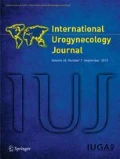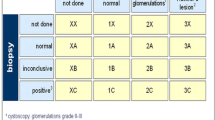Abstract
Introduction and hypothesis
An increasing number of female patients have received comorbid diagnoses of cystitis glandularis (CG) and interstitial cystitis (IC) at our institution. In addition, most of these patients suffer from coexisting obstructive lower urinary tract diseases (OLUTDs). In this study, we aimed to present evidence of the possible association between CG and IC and analyze the clinical features of this association.
Methods
We retrospectively reviewed the charts of 395 female patients diagnosed with CG and/or IC. The patients were divided into three groups: group A (CG only), group B (IC only), and group C (CG+IC). Chi-squared tests were applied to compare the prevalence rates of CG in patients with IC and in the general population, the prevalence rates of IC in patients with CG and in the general population, and the prevalence rates of OLUTD in the three patient groups.
Results
The prevalence rate of IC in patients with CG was significantly higher than that in the general population, while the prevalence rate of CG in patients with IC was also significantly higher than that in the general population. For groups A, B, and C, 93 (39.2 %), 30 (44.1 %), and 58 (64.4 %) cases respectively presented with OLUTDs, and the prevalence rate of OLUTDs varied significantly among the three groups.
Conclusions
This retrospective study found a possible association between CG and IC, and coexisting OLUTDs influenced this association.

Similar content being viewed by others
References
Semins MJ, Schoenberg MP (2007) A case of florid cystitis glandularis. Nat Clin Pract Urol 4(6):341–345
Medina Perez M, Valero Puerta JA, Valpuesta Fernandez I, Sanchez Gonzalez M (2001) Bladder adenocarcinoma with glandular cystitis areas. Arch Esp Urol 54(3):254–256
Jost SP, Dixon JS, Gosling JA (1993) Ultrastructural observations on cystitis cystica in human bladder urothelium. Br J Urol 71(1):28–33
Warren JW, Brown V, Jacobs S, Horne L, Langenberg P, Greenberg P (2008) Urinary tract infection and inflammation at onset of interstitial cystitis/painful bladder syndrome. Urology 71(6):1085–1090
Granados EA, Algaba F, Vicente Rodriguez J (1999) Cystitis glandularis. Arch Esp Urol 52(2):119–122
Yi X, Lu H, Wu Y et al (2014) Cystitis glandularis: a controversial premalignant lesion. Oncol Lett 8(4):1662–1664
Hanno P, Lin A, Nordling J et al (2010) Bladder Pain Syndrome Committee of the International Consultation on Incontinence. Neurourol Urodyn 29(1):191–198
Homma Y, Ueda T, Ito T, Takei M, Tomoe H (2009) Japanese guideline for diagnosis and treatment of interstitial cystitis. Int J Urol 16(1):4–16
Denis L, Pagano F, Nonis A, Robertson C, Romano P, Boyle P (1998) Double-blind, placebo-controlled trial to assess the efficacy and tolerability of mepartricin in the treatment of BPH. Prostate 37(4):246–252
Hsiao SM, Lin HH, Kuo HC (2013) International Prostate Symptom Score for assessing lower urinary tract dysfunction in women. Int Urogynecol J 24(2):263–267
Choi EP, Lam CL, Chin WY (2014) Validation of the International Prostate Symptom Score in Chinese males and females with lower urinary tract symptoms. Health Qual Life Outcomes 12:1
Elhebir ES, Hughes JD, Hilmi SC (2013) Calcium antagonists use and its association with lower urinary tract symptoms: a cross-sectional study. PLoS One 8(6), e66708
Parsons CL, Dell J, Stanford EJ et al (2002) Increased prevalence of interstitial cystitis: previously unrecognized urologic and gynecologic cases identified using a new symptom questionnaire and intravesical potassium sensitivity. Urology 60(4):573–578
Oravisto KJ (1975) Epidemiology of interstitial cystitis. Annales chirurgiae et gynaecologiae Fenniae 64(2):75–77
Jones CA, Nyberg L (1997) Epidemiology of interstitial cystitis. Urology 49(5ASuppl):2–9
Held PJ, Hanno PM, Wein AJ (1990) Epidemiology of interstitial cystitis: In: Hanno PM, Staskin DR, Krane RJ, Wein AJ (eds) Interstitial cystitis. Springer-Verlag, London, pp 29–48
Bade JJ, Rijcken B, Mensink HJ (1995) Interstitial cystitis in The Netherlands: prevalence, diagnostic criteria and therapeutic preferences. J Urol 154(6):2035–2037; discussion 2037–2038
Curhan GC, Speizer FE, Hunter DJ, Curhan SG, Stampfer MJ (1999) Epidemiology of interstitial cystitis: a population based study. J Urol 161(2):549–552
Ito T, Miki M, Yamada T (2000) Interstitial cystitis in Japan. BJU Int 86(6):634–637
Roberts RO, Bergstralh EJ, Bass SE, Lightner DJ, Lieber MM, Jacobsen SJ (2003) Incidence of physician-diagnosed interstitial cystitis in Olmsted County: a community-based study. BJU Int 91(3):181–185
Leppilahti M, Sairanen J, Tammela TL, Aaltomaa S, Lehtoranta K, Auvinen A (2005) Prevalence of clinically confirmed interstitial cystitis in women: a population based study in Finland. J Urol 174(2):581–583
Clemens JQ, Meenan RT, Rosetti MC, Gao SY, Calhoun EA (2005) Prevalence and incidence of interstitial cystitis in a managed care population. J Urol 173(1):98–102; discussion 102
Temml C, Wehrberger C, Riedl C, Ponholzer A, Marszalek M, Madersbacher S (2007) Prevalence and correlates for interstitial cystitis symptoms in women participating in a health screening project. Eur Urol 51(3):803–808; discussion 809
Choe JH, Son H, Song YS, Kim JC, Lee JZ, Lee KS (2011) Prevalence of painful bladder syndrome/interstitial cystitis-like symptoms in women: a population-based study in Korea. World J Urol 29(1):103–108
Berry SH, Elliott MN, Suttorp M, Bogart LM, Stoto MA, Eggers P (2011) Prevalence of symptoms of bladder pain syndrome/interstitial cystitis among adult females in the United States. J Urol 186(2):540–544
Rosenberg MT, Hazzard M (2005) Prevalence of interstitial cystitis symptoms in women: a population based study in the primary care office. J Urol 174(6):2231–2234
Bell TE, Wendel RG (1968) Cystitis glandularis: benign or malignant? J Urol 100(4):462–465
Susmano D, Rubenstein AB, Dakin AR, Lloyd FA (1971) Cystitis glandularis and adenocarcinoma of the bladder. J Urol 105(5):671–674
Sung MT, Lopez-Beltran A, Eble JN et al (2006) Divergent pathway of intestinal metaplasia and cystitis glandularis of the urinary bladder. Mod Pathol 19(11):1395–1401
Keay SK, Warren JW (2002) Is interstitial cystitis an infectious disease? Int J Antimicrob Agents 19(6):480–483
Erickson DR, Belchis DA, Dabbs DJ (1997) Inflammatory cell types and clinical features of interstitial cystitis. J Urol 158(3 Pt 1):790–793
Blaivas JG, Groutz A (2000) Bladder outlet obstruction nomogram for women with lower urinary tract symptomatology. Neurourol Urodyn 19(5):553–564
Lemack GE, Zimmern PE (2000) Pressure flow analysis may aid in identifying women with outflow obstruction. J Urol 163(6):1823–1828
Reed JF Jr (1970) Urethral-hymenal fusion: a cause of chronic adult female cystitis. J Urol 103(4):441–446
Park JM (2001) Is interstitial cystitis an underdiagnosed problem in children? A diagnostic and therapeutic dilemma. Urology 57 [6 Suppl 1]:30–31
Hanno PM, Landis JR, Matthews-Cook Y, Kusek J, Nyberg L Jr (1999) The diagnosis of interstitial cystitis revisited: lessons learned from the National Institutes of Health Interstitial Cystitis Database study. J Urol 161(2):553–557
Acknowledgements
This article is supported by Science and Technology Planning and Social Developing Project of Guangdong Province, China, NO. 2012B031800252.
Conflicts of interest
None.
Author information
Authors and Affiliations
Corresponding author
Rights and permissions
About this article
Cite this article
Zhang, W., Yao, Ys., Lin, Me. et al. Unexplained association between cystitis glandularis and interstitial cystitis in females: a retrospective study. Int Urogynecol J 26, 1835–1841 (2015). https://doi.org/10.1007/s00192-015-2780-z
Received:
Accepted:
Published:
Issue Date:
DOI: https://doi.org/10.1007/s00192-015-2780-z




